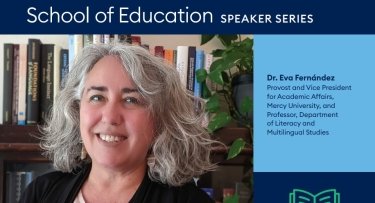Provost Eva Fernández Discusses the Important Role of Linguistics

What happens when bilingual students take an important test in a language that’s still new to them? What would it take to build a linguistically inclusive campus?
These and other questions came up during a linguistics lecture hosted in the spring by Mercy University’s School of Education as part of its Speaker Series. The program, “Linguistics: What Educators Should Know,” was presented by Dr. Eva Fernández, provost and vice president of academic affairs at Mercy. An enthusiastic audience of faculty members and educators, attending both in person at the Westchester Campus and on Zoom, engaged in a variety of topics including language development in children, the challenges of teaching in a multilingual classroom, and the cognitive benefits of bilingualism.
Fernández, who has published scholarly research and several books on bilingual issues and sentence processing, is a driving force behind Mercy’s effort to foster greater faculty expertise in teaching, especially as it impacts student learning in a multilingual community. As a lifelong advocate for linguistic inclusivity, Fernández has frequently challenged the assumption that language proficiency is tied to socio-demographic barriers.
During the Q&A period, Fernández fielded questions from participants about the importance of valuing diverse language backgrounds and overcoming unconscious bias toward non-native speakers. Audience member Angela Chaney-Grant, a clinical instructor of nursing, shared a story to illustrate how such assumptions harm students and impede their potential.
“I’ve seen bilingual students struggle with exams, simply because they don’t recognize words that I assumed they would know,” Chaney said. She recalled meeting with a student who had failed a test of material she knew well. When reviewing the test with the student, Chaney recognized her inability to convey her knowledge of the material was due to inherent biases on the test. “The test did not measure the student’s ability, so the test is what must be changed,” Chaney said.
Fernández also explored the concept of building additional academic language support resources at Mercy University, such as bilingual tutors and mentors. She urged faculty to reach out to the Mercy Center for Teaching and Learning for assistance and resources.
“Helping English language learners to acquire greater skills in academic language helps native speakers as well,” she said. “There’s a wealth of resources out there. We owe it to all our students to build a linguistically inclusive campus.”
